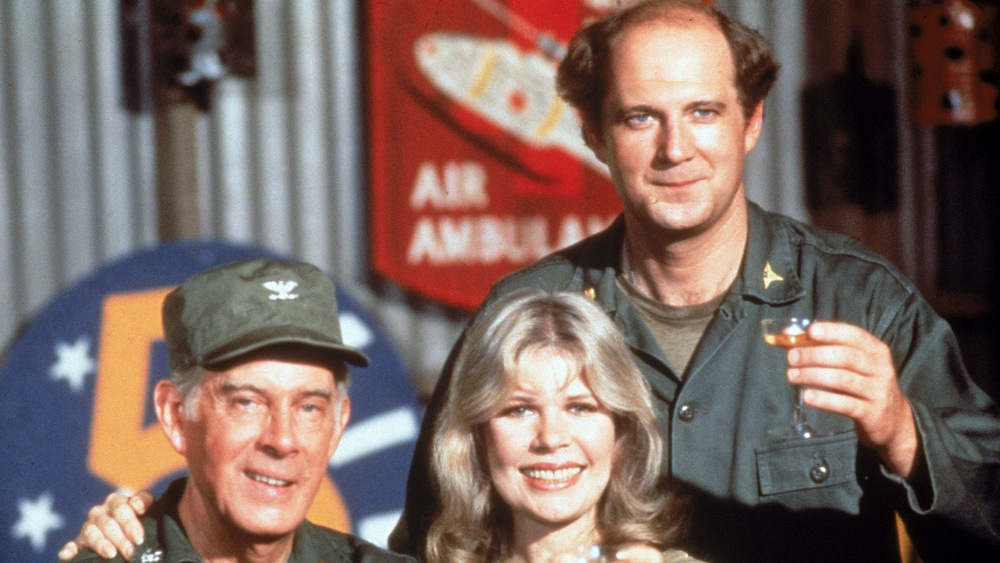David Ogden Stiers Dead at 75
The actor best known for his run on M*A*S*H died Saturday after a battle with colon cancer.

No Merchandising. Editorial Use Only. No Book Cover Usage.Mandatory Credit: Photo by 20th Century Fox/Kobal/REX/Shutterstock (5886039bb)David Ogden Stiers, Henry/Harry Morgan, Loretta SwitMash – 1972-198320th Century FoxTelevision
Entertainment Weekly (“M*A*S*H actor David Ogden Stiers dies at 75“):
M*A*S*H actor David Ogden Stiers died of cancer on Saturday, his agent confirmed. He was 75.
“I am very sad to report that David died this morning March 3, 2018 peacefully at his home in Newport, Oregon after a courageous battle with bladder cancer,” Stiers’ agent, Mitchell K. Stubbs tweeted. “His talent was only surpassed by his heart.”
Stiers earned two Emmy nominations for his role on M*A*S*H as Major Charles Winchester III, a talented surgeon who filled the void left when Larry Linville’s Frank Burns left the series. Stiers starred on the series from 1977 to 1983 and followed it with regular appearances on North and South, Star Trek: The Next Generation, Matlock, Touched by an Angel, and Frasier, as well as a memorable performance as the father, Al Meyer, in 1985’s Better Off Dead…. He earned a third Emmy nomination in 1984 for his portrayal of United States Olympic Committee founder William Milligan Sloane in the NBC miniseries The First Olympics: Athens 1896.
The actor had a prolific voice acting career which included the roles of Cogsworth in Beauty and the Beast, Governor Ratcliffe and Wiggins in Pocahontas, Jumba in Lilo & Stitch, and the narrator in M. Night Shyamalan’s The Lady in the Water.
Variety (“David Ogden Stiers, Major Winchester on ‘MASH,’ Dies at 75“):
The actor, with his educated, resonant intonations — though he did not share Major Winchester’s Boston Brahmin accent — was much in demand for narration and voiceover work, and for efforts as the narrator and as of Disney’s enormous hit animated film “Beauty and the Beast,” he shared a Grammy win for best recording for children and another nomination for album of the year.
He voiced Dr. Jumba Jookiba, the evil genius who created Stitch, in 2002’s “Lilo & Stitch” and various spinoffs; once he became part of the Disney family, Stiers went on to do voicework on a large number of movies, made for TV or video content and videogames.
In addition to serving as narrator and as the voice of Cogsworth in “Beauty and the Beast” in 1991, he voiced Governor Ratcliffe and Wiggins in Disney’s 1995 animated effort “Pocahontas” and voiced the Archdeacon in Disney’s “The Hunchback of Notre Dame.” He also contributed the voice of the grandfather for the English-language version of Hayao Miyazaki’s 1992 animation “Porco Rosso” and of Kamaji in Miyazki’s classic “Spirited Away” in 2001. From 2011-15 he recurred on Cartoon Network’s “Regular Show.”
Indeed, it was his voice that earned him his first screen credit — as the announcer in George Lucas’ 1971 film “THX 1138.”
Stiers was also known for the eight Perry Mason TV movies he made between 1986-88 in which his prosecuting attorney invariably lost to Raymond Burr’s Mason, and more recently he had recurred on the USA Network series “The Dead Zone” from 2002-07 as the Rev. Eugene Purdy, the chief antagonist to star Anthony Michael Hall’s Johnny Smith.
In addition Stiers worked repeatedly for director Woody Allen, appearing in “Shadows and Fog,” “Mighty Aphrodite,” “Everybody Says I Love You” and “Curse of the Jade Scorpion” (in which he played a mysterious hypnotist).
On “MASH” Stiers’ Major Winchester was witty where Frank Burns had been vapid — with his Harvard education, a match for Alan Alda’s Hawkeye in the operating room and, unlike Frank, a worthy adversary in the ongoing battle of the pranks in the Swamp. So it was always poignant when an emotional crack opened in his self-satisfied mien.
In the season eight episode “Morale Victory,” Winchester is proud of saving a wounded soldier’s leg, only to learn that the minor injury to the young man’s hand is all that matters to him, as he is a concert pianist. The soldier feels he has no reason for living, but in a powerful performance by Stiers, Winchester provides him with piano music written for a single hand and shows him the empathy necessary to save him.
Another time the audience saw a different side to Stier’s Winchester came in the ninth-season episode in which he swallows his pride and attempts to curry favor with a general who can send him back to the comforts of Tokyo — but in the end, when the general asks him to testify unjustly against Margaret Houlihan — Winchester declares, “I will not — even for a return to that pearl of the Orient Tokyo — lie to protect you while destroying a friend’s career!”
I suppose it’s a mixed blessing for an actor to have such an iconic role that it’s the headline in every obituary written about them despite decades of stellar work afterward. But so it was with Stiers and Charles Emerson Winchester III. While the Larry Melville “Frank Burns” character he replaced was funnier, Stiers’ “Winchester” was far more interesting. It never seemed plausible that Burns made it through medical school and a surgery residency, let alone was sufficiently accomplished to be commissioned a major. Winchester was a much more complex, rich foil for Hawkeye and Hunnicutt.






Sad news indeed. Much like the original Star Trek, the surviving cast members of MASH are slowly leaving us. McLean Stephenson, Larry Linville, Wayne Rogers, and William Christopher have all passed away over the past 20 years or so.
As for the differences between Burns and Winchester, I do agree that Burns was funnier but I saw an interview with Linville that was made for the Emmys several years before his death in 2000. He said that the main reason he left the show was because he felt as though the Burns character had gone as far as it could go and was in danger of descending into parody if he stayed much longer. On that note I think he probably was right, and having him leave at the same time that Houlihan got married was probably for the best.
Also, I grew to like Winchester. As one of the obituaries I read last night noted, he started off as exceedingly annoying and arrogant, but he was also a much better foil for Hawkeye and B.J. than Burns had become. Additionally, thanks in no small part to Stiers’ talent as an actor, the Winchester character developed a humanity to it that Burns never really had. This is probably best exemplified by the story he was part of during the Series Finale regarding the Chinese musicians.
You know how some people insist on comparing you to an actor or other celebrity with whom you share little? The two I’ve gotten consistently were Steve Landesberg from Barney Miller, and David Ogden Stiers. No, neither looks like me, but they both had somewhat elevated vocabularies and often took a condescending tone.
Stiers was a smart move my producers. Frank Burns had been milked for all he could give, they needed a foil who was less easily managed by Hawkeye.
David Ogden Stiers regarded Col. Potter’s tontine speech in the “Old Soldiers” episode as his favorite memory of the show.
Col. Potter had the camp worried sick with his odd melancholy. But it’ll be hard to keep a dry-eye when he shares with them the reason for his mood.
It seems fitting to revisit that memorable toast at this time …
https://www.youtube.com/watch?v=ize5lZoIlBk
For years I’ve made the comparison: Frank Burns was the villain, while Charles Emerson Winchester III was the foil. Yes, he was arrogant, he was pompous, he was bombastic… but he had the skills and intellect to back them up. “It ain’t bragging if you can do it.” And I don’t think anyone else could have pulled off the role as well as Stiers.
He was also the best part of the first season of “Two Guys, A Girl, And A Pizza Place.” He played Mr. Bauer, the crazy homeless man who related stories from his past that, oddly enough, echoed plots from famous movies. His finest moment was when he stopped the police from breaking up a party.
They dropped his character after the first season, sadly.
@Bob The Arqubusier: I’d forgotten that role. I enjoyed that show for a while but lost interest pretty quickly after the first season. Maybe that was part of the reason why.